初中英语语法三大从句宾语定语状语表语同位语从句汇总及练习题
- 格式:doc
- 大小:164.50 KB
- 文档页数:20
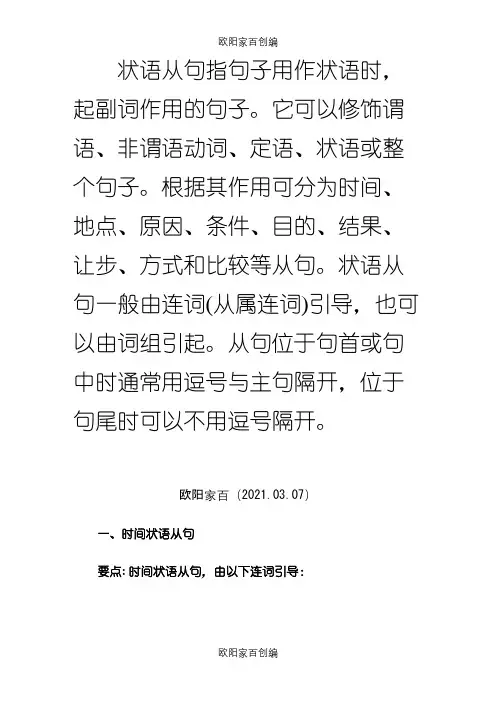
状语从句指句子用作状语时,起副词作用的句子。
它可以修饰谓语、非谓语动词、定语、状语或整个句子。
根据其作用可分为时间、地点、原因、条件、目的、结果、让步、方式和比较等从句。
状语从句一般由连词(从属连词)引导,也可以由词组引起。
从句位于句首或句中时通常用逗号与主句隔开,位于句尾时可以不用逗号隔开。
欧阳家百(2021.03.07)一、时间状语从句要点: 时间状语从句,由以下连词引导:when while as after before as soon as since till /until by the time 在时间状语从句中,要注意时态一致。
一般情况下主句是将来时的时候,从句要用一般现在时。
1.when当。
的时候mozart started writing music when he was four years old.(当)莫扎特的时候,开始写音乐作品。
2.while当。
时he visited a lot of places while he was traveling.他在旅途中参观了许多地方。
3.as在。
的同时;一边。
一边。
he smiled as he stood up.他一边站起来一边笑着。
4.after在。
之后he left the classroom after he had finished his homework the other day.前几天做完作业之后回的家。
5.before 在。
之前mr. brown had worked in a bank for a year before he came here.布朗先生来这之前已经在一家银行里工作一年了。
6.as soon as 一。
就。
we began to work as soon as we got there.我们一到那就开始工作。
i will write to you as soon as i get home.我一到家就给你写信。
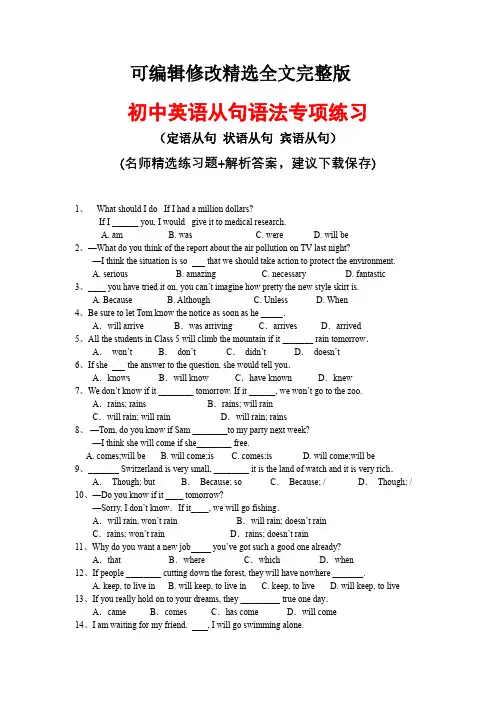
可编辑修改精选全文完整版初中英语从句语法专项练习(定语从句状语从句宾语从句)(名师精选练习题+解析答案,建议下载保存)1、---What should I do If I had a million dollars?--- If I ______ you, I would give it to medical research.A. amB. wasC. wereD. will be2、—What do you think of the report about the air pollution on TV last night?—I think the situation is so that we should take action to protect the environment.A. seriousB. amazingC. necessaryD. fantastic3、____ you have tried it on, you can’t imagine how pretty the new style skirt is.A. BecauseB. AlthoughC. UnlessD. When4、Be sure to let Tom know the notice as soon as he _____.A.will arrive B.was arriving C.arrives D.arrived5、All the students in Class 5 will climb the mountain if it _______ rain tomorrow.A.won’t B.don’t C.didn’t D.doesn’t6、If she the answer to the question, she would tell you.A.knows B.will know C.have known D.knew7、We don’t know if it ________ tomorrow. If it ______, we won’t go to the zoo.A.rains; rains B.rains; will rainC.will rain; will rain D.will rain; rains8、—Tom, do you know if Sam ________to my party next week?—I think she will come if she________ free.A. comes;will beB. will come;isC. comes;isD. will come;will be9、_______ Switzerland is very small, ________ it is the land of watch and it is very rich.A.Though; but B.Because; so C.Because; /D.Though; / 10、—Do you know if it ____ tomorrow?—Sorry, I don’t know.If it____, we will go fishing.A.will rain, won’t rain B.will rain; doesn’t rainC.rains; won’t rain D.rains; doesn’t rain11、Why do you want a new job you’ve got such a good one already?A.that B.where C.which D.when12、If people ________ cutting down the forest, they will have nowhere _______.A. keep, to live inB. will keep, to live inC. keep, to liveD. will keep, to live13、If you really hold on to your dreams, they _________ true one day.A.came B.comes C.has come D.will come14、I am waiting for my friend. , I will go swimming alone.A. If he doesn’t comeB. If he won’t comeC. If he hasn’t comeD. If he isn’t coming15、My necklace is not the only thing ______is missing. So my mother is so angry at ____I did_______she walks out and close the door heavily behind me.A.that , what , that B.that , that , that C.which, what , that D.which , that , that 16、_______ well you drive,you must drive carefully.A.No matter where B.In order that C.No matter how D.As soon as17、No matter how hard he worked, ________.A. he could not do any betterB. and he could not do any betterC. so he could not do any betterD. but he could not do any better18、We don’t have much homework now and our school bags are ______ they used to be.A.as heavy as B.not as heavy as C.as heavily as D.not as heavily as 19、-Dad,I’m sorry I didn’t do well in my test this time.-Don’t worry.I’m sure you will never give up(放弃)until you __________.A.succeed B.success C.will succeed D.successful20、The students in the higher grades I met in a football game are my good friends now.A. whenB. whichC. who21、Tony, tell me the result of the discussion_____ you had with your dad yesterday.A. whatB. whichC. whenD. who22、The story__ I read the newspaper was about a common problem among teenagers.A. whoseB. whoC. thatD. where23、-Where did you go last week?-I went to Zhang Aiping’s hometown and visited the house he was born in.A. thatB. thereC. whoD. whose24、—I only heard of him a little. But what are the other important things ______ done by him?—He also set up Tongmenghui with Huang Xing.A.thatB.whichC.whoD.which were25、Can you lend me the book ______the other day?A. about which you talkedB. which you talkedC. about that you talkedD. that you talked26、The people ______in the paper did not like it, but other reader liked it very much.A. who was writtenB. who were writtenC. who were written aboutD.whom were written about27、The college students asked the soldier everything _____he saw at the front.A. thatB. whichC. whatD.all what28、I like the cartoon ______ has a happy ending and makes me ______.A. which; to laughB. that; to laughC. whose; laughingD. which; laugh29、Nearly all the streets are in straight lines, ________ from east to west. Those________ runfrom north to south are called avenues.A. running; thatB. run; whoC. running; whoD. run; that30、He has dropped the necklace to the drawer ________the money is kept.A. in whereB. in whichC. under whichD. which31、I prefer not to eat too much food is flied,like French fries.A.that B.what C.it D.不填32、Finally, the thief handed everything _______he had stolen to the police.A. whichB. whatC. whateverD.that33、--- What can we learn from the Chinese story “Going south by driving the chariot north”?--- I realized that ________________________.A. Life is like a race, you either take the lead or fall behind.B. A miss is as good as a mile.C. As a doctor, you can’t be too careful.D. Practise makes perfect.34、--- Could you please tell me ________?--- Two months ago.A. when did you take this photoB. when you took this photoC. where did you take this photoD. where you took this photo35、 - So, can you tell me ______ here today?- Well, I was walking down Centre Street when a UFO landed.A. what did you seeB. what you sawC. when did you see itD. when you saw36、---Could you tell me_________?---More than a year.A. how soon will Yangzhou-Taizhou Airport be builtB. how long has Yangzhou-Taizhou Airport been in serviceC. how soon Yangzhou-Taizhou Airport will be builtD. how long Yangzhou-Taizhou Airport has been in service37、— Could you tell me ___?— No. Let’s go and have a look. Maybe someone is hurt, and we can help him.A. what was happened thereB. when they are doing thereC. what is going on thereD. what they were going on there38、By reading the article, we know how ______ in our daily life.A.will we protect the earthB.we can reduce pollutionC.should we save waterD.we must recycle things39、Can you tell me ______ ?A. What your name isB. How does he get to schoolC. he lives whereD. What time she leave home40、I want to write to Rose, but I don’t know __________.A.where is his email address B.where his email address isC.what place is his email address D.what his email address is参考答案1、C2、A3、C4、C5、D6、D7、D8、B9、D10、B11、D12、C13、D14、A15、A16、C17、A18、B19、A20、C21、B22、C23、A24、D 25、A.26、C27、A28、D29、A.30、B31、A32、D33、B34、B35、B36、D37、C38、B39、A40、D。

从句专项在英语中,主要有三大从句,即名词性从句(包括主语从句,宾语从句,表语从句,同位语从句)、形容词性从句(即定语从句)、副词性从句(即状语从句,包括时间、条件、结果、目的、原因、让步、地点、方式等)。
定语从句定语从句(attributive clause),顾名思义,就是一个句子作定语从属于主句。
定语一般是由形容词充当,所以定语从句又称作形容词从句。
另外,定语从句是由关系代词或关系副词引导的,故又称作关系从句。
定语从句一般放在它所修饰的名词或代词之后,这种名词或代词被称作先行词。
请看示例:The woman who lives next door is a teacher.先行词定语从句在所有的从句中,算定语从句最难掌握,因为汉语里没有定语从句,汉语里只有定语,而且总是放在名词之前来修饰名词宾语从句宾语从句是英语复合句中的其中非常重要的从句之一。
它是用一个句子做另一个句子的宾语,将这个句子叫做宾语从句。
宾语从句做介词或及物动词的宾语。
现在从下列三个方面总结归纳如下:一,引导词A,由that 引导的陈述句性的宾语从句,在很多动词如say, think, wish , hope, see, believe, agree, expect, hear , feel 等动词后。
连词that 只起连接作用,在从句中不做句子的成分例:I told him that he was wrong.l 在think,believe, suppose, expect 等动词引起的宾语从句中,有时谓语尽管是否定意义,却不用否定形式,而将think 等动词变为否定形式。
例:I don’t think you are right. (我认为你做的不对)l 在许多带有复合宾语的句子中,that 引导的宾语从句经常移到句子的后面,而用it 做形式宾语。
例:We think it wrong that he told a lie to everyone (我认为他向每一个人撒谎是错误的)B,由连词if、whether 引导的表示“是否…”的宾语从句。
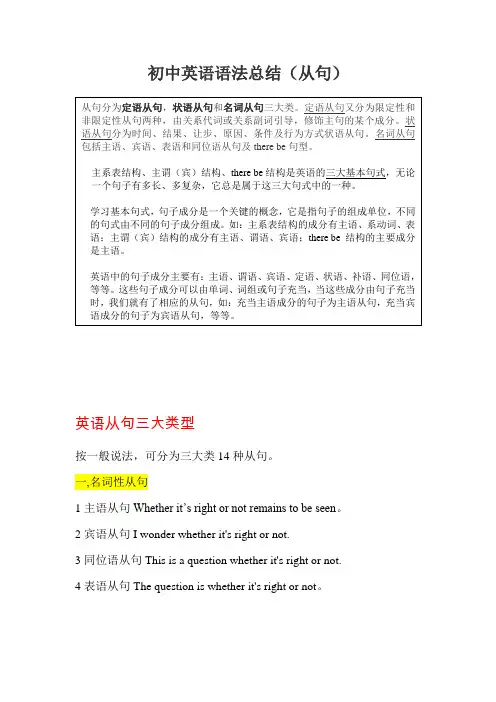
初中英语语法总结(从句)英语从句三大类型按一般说法,可分为三大类14种从句。
一,名词性从句1主语从句Whether it’s right or not remains to be seen。
2宾语从句I wonder whether it's right or not.3同位语从句This is a question whether it's right or not. 4表语从句The question is whether it's right or not。
二,定语从句1限定性定语从句She is the student who can speak English well。
2非限定性定语从句She is the student, who can speak English well。
三,状语从句1时间状语从句The fact will come out when he comes here。
2地点状语从句You can go wherever you like。
3原因状语从句Pay more attention to your lessons because you are astudent。
4方式状语从句He walks as if he were a king.5目的状语从句She went to Japan so that she could learn Japanese well. 6结果状语从句She went to Japan so that she learned Japanese well.7条件状语从句I will understand it if he tells me.8让步状语从句He knows a lot though he is little.1.定语从句There are some old books in the box.The boy dressed in blue is from America。
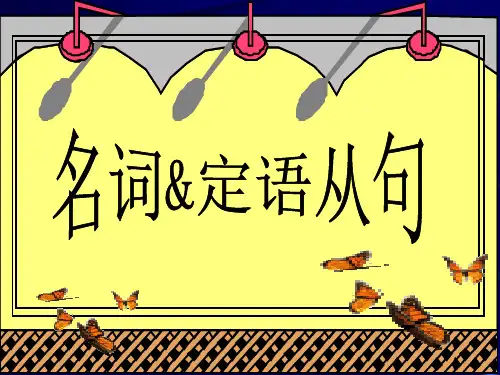
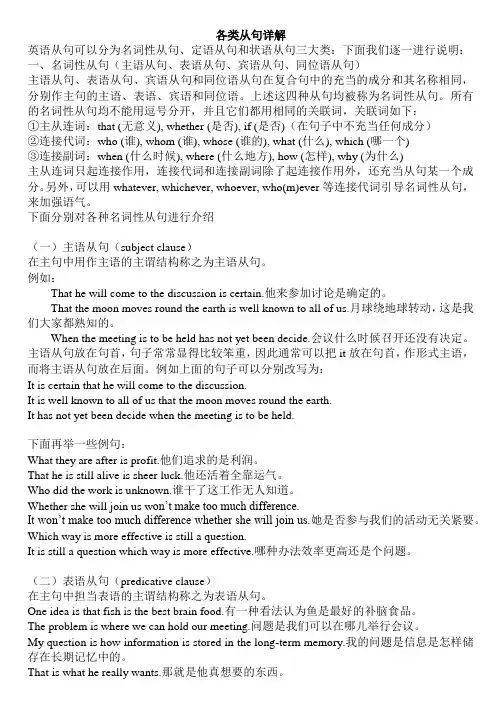
各类从句详解英语从句可以分为名词性从句、定语从句和状语从句三大类:下面我们逐一进行说明:一、名词性从句(主语从句、表语从句、宾语从句、同位语从句)主语从句、表语从句、宾语从句和同位语从句在复合句中的充当的成分和其名称相同,分别作主句的主语、表语、宾语和同位语。
上述这四种从句均被称为名词性从句。
所有的名词性从句均不能用逗号分开,并且它们都用相同的关联词,关联词如下:①主从连词:that (无意义), whether (是否), if (是否)(在句子中不充当任何成分)②连接代词:who (谁), whom (谁), whose (谁的), what (什么), which (哪一个)③连接副词:when (什么时候), where (什么地方), how (怎样), why (为什么)主从连词只起连接作用,连接代词和连接副词除了起连接作用外,还充当从句某一个成分。
另外,可以用whatever, whichever, whoever, who(m)ever等连接代词引导名词性从句,来加强语气。
下面分别对各种名词性从句进行介绍(一)主语从句(subject clause)在主句中用作主语的主谓结构称之为主语从句。
例如:That he will come to the discussion is certain.他来参加讨论是确定的。
That the moon moves round the earth is well known to all of us.月球绕地球转动,这是我们大家都熟知的。
When the meeting is to be held has not yet been decide.会议什么时候召开还没有决定。
主语从句放在句首,句子常常显得比较笨重,因此通常可以把it放在句首,作形式主语,而将主语从句放在后面。
例如上面的句子可以分别改写为:It is certain that he will come to the discussion.It is well known to all of us that the moon moves round the earth.It has not yet been decide when the meeting is to be held.下面再举一些例句:What they are after is profit.他们追求的是利润。
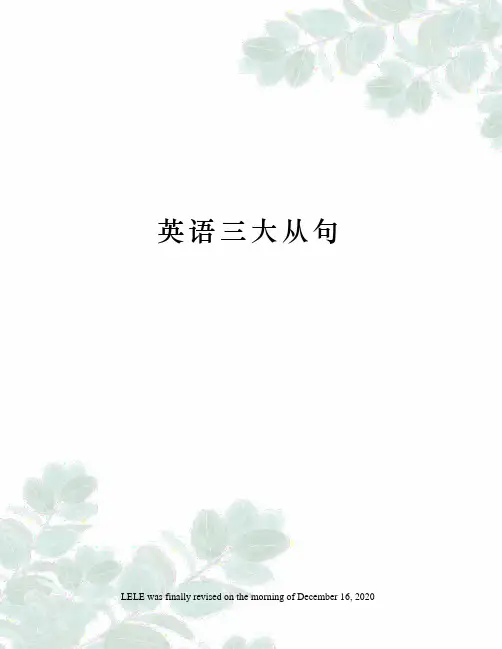
英语三大从句LELE was finally revised on the morning of December 16, 2020复合句【语法要点】复合句是由一个主句加一个或几个从句所构成的句子。
从句只用作句子的一个成分,不能独立。
根据从句在句子中的作用,可分为名词性从句、定语从句和状语从句三类。
(一)名词性从句名词性从句包括主语从句、表语从句、宾语从句、同位语从句。
其关联词有连接词that、if、whether;疑问代词who、what、which和疑问副词when、where、how、why等。
1)if不能引导表语从句。
连接代词who、what、whose、which不能引导同位语从句。
2)有时as、as if/though、because也可以引导表语从句,能跟表语从句的谓语动词一般为系动词be、seem、look等。
例如:Things are not always as they seem to be.事情并不总是像表面上看来的那样。
It looks as if it were going to rain. It is because you eat too much.3)介词宾语不可以用which来引导,而要用what来引导。
例如:We can learn what we did not know. He will talk to us about what he saw in the .4)连词that引导的名词性从句除能用在except、but、in后之外很少作介词的宾语,。
其它一些介词的宾语从句如果由连词that引导,则需用it先行一步作形式宾语。
例如:He is a good student except that he is careless.You may depend on it that they will support you.5)若主句谓语动词是及物动词make、find、think、see、hear等,则把宾语从句置于宾语补足语之后,用it作形式宾语。
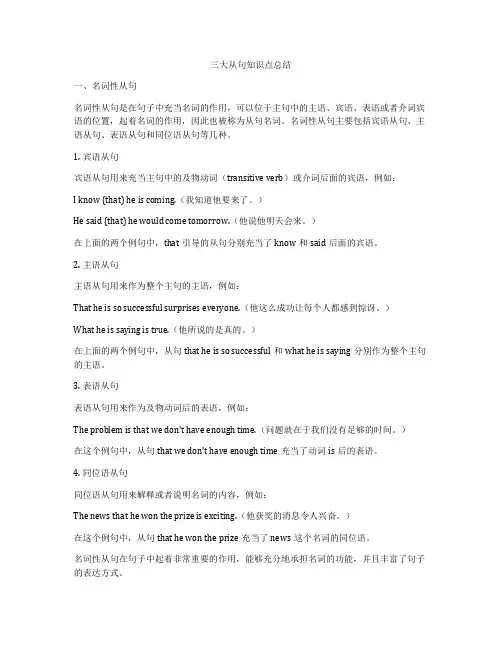
三大从句知识点总结一、名词性从句名词性从句是在句子中充当名词的作用,可以位于主句中的主语、宾语、表语或者介词宾语的位置,起着名词的作用,因此也被称为从句名词。
名词性从句主要包括宾语从句、主语从句、表语从句和同位语从句等几种。
1. 宾语从句宾语从句用来充当主句中的及物动词(transitive verb)或介词后面的宾语,例如:I know (that) he is coming.(我知道他要来了。
)He said (that) he would come tomorrow.(他说他明天会来。
)在上面的两个例句中,that引导的从句分别充当了know和said后面的宾语。
2. 主语从句主语从句用来作为整个主句的主语,例如:That he is so successful surprises everyone.(他这么成功让每个人都感到惊讶。
)What he is saying is true.(他所说的是真的。
)在上面的两个例句中,从句that he is so successful和what he is saying分别作为整个主句的主语。
3. 表语从句表语从句用来作为及物动词后的表语,例如:The problem is that we don't have enough time.(问题就在于我们没有足够的时间。
)在这个例句中,从句that we don't have enough time充当了动词is后的表语。
4. 同位语从句同位语从句用来解释或者说明名词的内容,例如:The news that he won the prize is exciting.(他获奖的消息令人兴奋。
)在这个例句中,从句that he won the prize充当了news这个名词的同位语。
名词性从句在句子中起着非常重要的作用,能够充分地承担名词的功能,并且丰富了句子的表达方式。
二、定语从句定语从句用来修饰名词或代词,对其进行进一步的说明或者限定,增加句子的信息量。
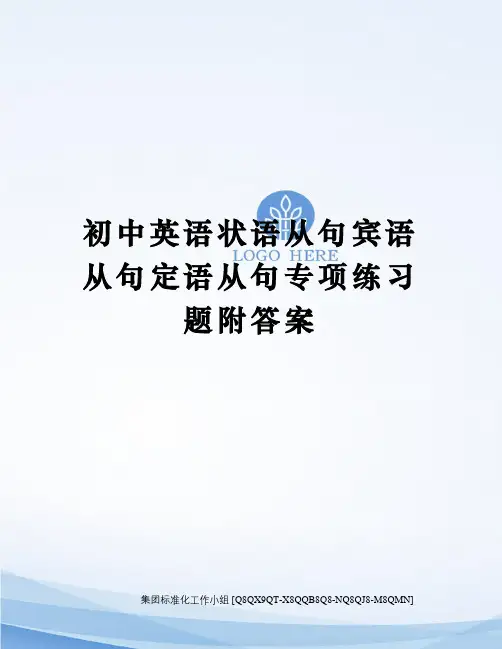
初中英语状语从句宾语从句定语从句专项练习题附答案集团标准化工作小组 [Q8QX9QT-X8QQB8Q8-NQ8QJ8-M8QMN]状语从句练习( ) 1. I won't believe you___ I have seen it with my own eyes.A. beforeB. untilC. afterD. when( ) ___ home ___ she was satisfied ___ his answer yesterday.A. didn't go; until; withB. wasn't go; after; toC. doesn't go; before; withD. didn't go; until; to( ) 3. He ___ back until the work ___ done.A. isn't; will beB. isn't; isC. won't be; will beD. won't be; is( ) 4. They didn't start the work ___ their teacher came back.A. untilB. whileC. as soon asD. if( )5. Tom will call me as soon as he ___ Shanghai.A. arrivesB. will reachC. arrives inD. get to( )6. I'm sure he'll come to see me before he ___ Beijing.A. will leaveB. is leavingC. leaveD. leaves( )7. Tom has got a watch. He ___ it for two years. It _______ by his father.A. has bought; was boughtB. has got; is bought ,C. was bought; has bought .D. has had; was bought "'( )8. When he got to the station, the train ___.A. leftB. had leftC. leavesD. has left( ) 9. The boy told his father what he ___ in the street.A. sawB. have seenC. had seenD. see( ) 10. We ___ TV when the telephone ____.A. watched; was ringingB. were watching; rangC. watch; ringsD. are watching; rang( ) 11. I ___ you for a long time. Where ___ you ___A. didn't see; did; goB. didn't see; have; goneC. haven't seen; have; beenD. haven't seen; have; gone( ) 12. Tom___ China for 3 years.A. has beenB. has been inC. has been toD. has been at( ) 13. -Hello! May I speak to Bob -Sorry, but he ___ for a month.A. had been awayB. was leftC. leftD. has been away( )14. Betty didn't go to see the film yesterday ___ she was ill.A. becauseB. butC. untilD. if( )15. ___ he came to study in the university, he has made much progress in thestudy of English.A. WhileB. WhenC. SinceD. After( )16. I'd like to go swimming _____ the water is not too cold.A. forB. unlessC. ifD. whether( ) 17. There are ___ many league members in class 2 ___ in Class 4.A. both; andB. 'so; thatC. either; orD. as; as( )18. Suzhou is not ____ beautiful ____ Hangzhou. A. as; than B. so; as C. even; than D. /; than( ) 19. I want to know ___ she is going to see a film.A. ifB. thatC. whatD. which( )20. I'll go to see the film with you___I have time this evening.A. whetherB. soC. ifD. when( ) 21. ___ you study harder, you'll never pass the final exam.A. IfB. UntilC. UnlessD. Except( ) 22. Although it was raining,-- still worked in the fields.A. but theyB. and theyC. theyD. and yet they( )2 3 .___ she is very old, ___ she can still work eight hours a day.A. Because; soB. Though; butC. As; yetD. Though; yet( ) 24. Please answer the question in a loud enough voice ___ all the class mayhear.A. so, thatB. orC. in order thatD. and( ) hurried___I wouldn't be late for class.A. soB. so thatC. ifD. unless( ) dictionary is so expensive ___ I can't buy . because B. when C. that D. if( ) 27. I got there ___ late ___ I didn't see him. A. too; to B. such; that C. so; that D. so; as( ) 28. He has___ an interesting book that we want to read it.A. soB. suchC. the sameD. as答案:1-5BADAC 6-10DDBCB 11-15CBDAC 16-20CDBAC 21-25CCDCB 26-28CCB宾语从句练习1. I don’t know _____ he will come tomorrow. _____ he comes, I’ll tell you.A. if; WhetherB. whether; WhetherC. if; ThatD. if; if2. Could you tell me ____ the radio without any helpA. how did he mendB. what did he mendC. how he mendedD. what he mended3. Can you tell me how many English words ____ since 1996A. have you learnedB. did you learnC. you have learnedD. you learned4. Miss Li wants to know _____ next week. A. when my uncleleaves B. when will my uncle C. where my uncle will stay D. where does myuncle stay5. I don’t know ____ Jane was late for school this morning.A. whoB. whatC. whomD. why6. They don’t know ____ their presents are.A. whenB. whyC. whatD. how7. Mike asked the girl in the shop ____ the watch ____ cheap enough.A. that; isB. if; wasC. that; wasD. whether; is8. I think he ____ back next . comeB. will comeC. cameD. has come9. Xiao Mao told me he ____ a film with his mother the next day.A. would seeB. will watchC. would lookD. will see10. Could you tell me if it ____ tomorrowA. rainB. will rainC. rainingD. rains11. He said that he ____ speak a little English when he was five.A. mightB. wouldC. couldD. can12. I want to know if they ____ the spring sports meeting next month. If they ____it, I must get ready for it.A. hold; will holdB. will hold; holdC. hold; holdD. will hold; will hold13. –Excuse me. Could you tell me ____ -Certainly.A. when can I get to the stationB. I can get to which stationC. which stationcan I get to D. how I can get to the station14. –What did your mother say, Tom -She asked me why ____.A. my sister cryingB. my sister was cryingC. is my sister cryingD. was mysister crying15. I wonder what time _____ arrive.A. does the trainB. will the trainC. the trainD. the train will16. Did you hear _____A. what did I sayB. what I saidC. that I saidD. I said which17. Can you tell me which room _____A. does he live inB. does he livesC. he lives inD. he lives18. The little boy often asks me what ______A. will our life of tomorrowB. will our life tomorrow be likeC. our life of tomorrow likeD. our life of tomorrow will be like19. Do you really know _____ usedA. how widely English isB. how wide is EnglishC. English is how widelyD. how is English wide20. Would you please tell me ______ with Peter He looks unhappy.A. what’s the matterB. what wrong isC. the wrong is whatD. what wrong it was21. –Excuse me, where _____ Do you know -Yes. I know where _____A. Jim lives; he livesB. does Jim live; do he liveC. Jim lives; does he liveD. does Jim live; he lives22. I didn’t know _____ and _____.A. what’s his name; how old he isB. what his name was; how old he wasC. what his name is; how is he oldD. that was his name; he was how old23. My friend hasn’t decided _____ on a trip to Wuxi on holiday.A. if he goesB. when will he goC. if he’ll goD. where he go24. Did you ask her what ______ outsideA. was happened to himB. he had happenedC. he happenedD. had happened tohim25. The man in the shop asked the woman _____A. which kind does she likeB. which kind she isC. which kind is she likesD.which kind she likes26. No one told us _____, so we need your help. A. how should we doB. what shouldwe do C. how to do it D. what to do it27. I don’t know ______ the day after tomorrow.A. when does he comeB. how will he comeC. if he comesD. whether he’ll come28. –Could you tell me _____-Yes, they _____ to the library.A. where are thetwins; have been B. where the twins are; have goneC. where were the twins;have been D where the twins were; have gone答案:1-5DCCCD 6-10CBBAB 11-15CBDBD 16-20BCDAA 21-25DBCDD26-28CDB定语从句练习've read all the books you gave me. us about thepeople and the places are different from ours. John said that Suzhou was the first city he had visited in China. TV play I watched last night is the best one I have watched this year.this the museum you visited the other daywhich oneis no difficulty can't be overcome in the world.was the supermarket I bought this kind of tin.house we live is not big.that which, is the capital of China,is a beautiful city.D./10..She was no longer the woman she was. 's the hotel last year. we stayed that we stayedwe stayed at we stayed've made the same mistake you made last time.is not such an interesting magazine I thought.D./14. you know,he is a famous musician. D./Zhou, native language was Chinese,could read and write several foreignlanguages.you know the actor you saw playing Hamlet is now doing King Leartook my friend to the Summer Palace, we had some photos taken.D./all remember the days we studied together at school.D./showed the doctor the place I felt the pain.'m one of the students well in English in my class.does do does didis the baby tomorrow.whom I shall look I shall look afterI shall look after whom I shall look afteris the fastest train is going to Nanjing.D./答案:1-5DAADA 6-10AACCA 11-15DDBAA 16-20AACCB21-22BA。
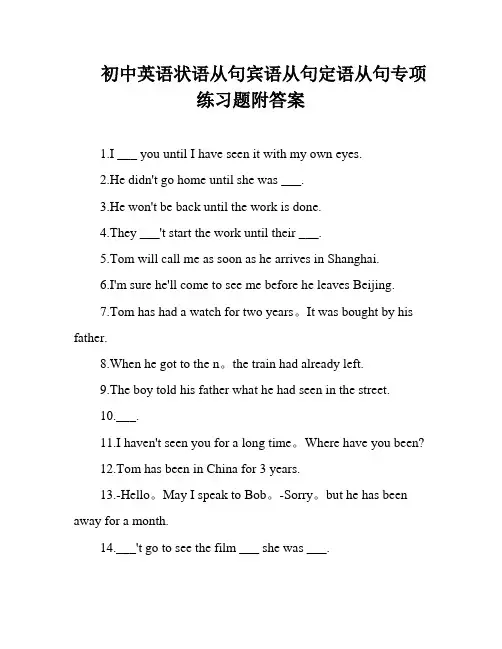
初中英语状语从句宾语从句定语从句专项练习题附答案1.I ___ you until I have seen it with my own eyes.2.He didn't go home until she was ___.3.He won't be back until the work is done.4.They ___'t start the work until their ___.5.Tom will call me as soon as he arrives in Shanghai.6.I'm sure he'll come to see me before he leaves Beijing.7.Tom has had a watch for two years。
It was bought by his father.8.When he got to the n。
the train had already left.9.The boy told his father what he had seen in the street.10.___.11.I haven't seen you for a long time。
Where have you been?12.Tom has been in China for 3 years.13.-Hello。
May I speak to Bob。
-Sorry。
but he has been away for a month.14.___'t go to see the film ___ she was ___.15.Since he came to study in the university。
he has made much progress in the study of English.16.I'd like to go swimming if the water is not too cold.1.I am unsure whether he will come tomorrow。
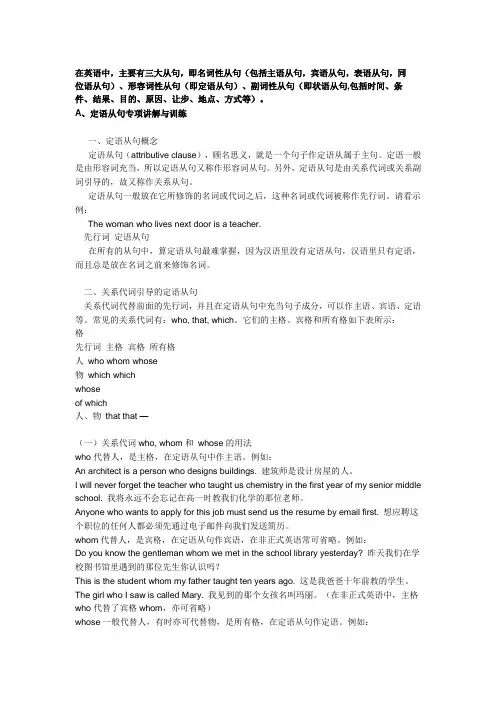
在英语中,主要有三大从句,即名词性从句(包括主语从句,宾语从句,表语从句,同位语从句)、形容词性从句(即定语从句)、副词性从句(即状语从句,包括时间、条件、结果、目的、原因、让步、地点、方式等)。
A、定语从句专项讲解与训练一、定语从句概念定语从句(attributive clause),顾名思义,就是一个句子作定语从属于主句。
定语一般是由形容词充当,所以定语从句又称作形容词从句。
另外,定语从句是由关系代词或关系副词引导的,故又称作关系从句。
定语从句一般放在它所修饰的名词或代词之后,这种名词或代词被称作先行词。
请看示例:The woman who lives next door is a teacher.先行词定语从句在所有的从句中,算定语从句最难掌握,因为汉语里没有定语从句,汉语里只有定语,而且总是放在名词之前来修饰名词。
二、关系代词引导的定语从句关系代词代替前面的先行词,并且在定语从句中充当句子成分,可以作主语、宾语、定语等。
常见的关系代词有:who, that, which。
它们的主格、宾格和所有格如下表所示:格先行词主格宾格所有格人who whom whose物which whichwhoseof which人、物that that —(一)关系代词who, whom和whose的用法who代替人,是主格,在定语从句中作主语。
例如:An architect is a person who designs buildings. 建筑师是设计房屋的人。
I will never forget the teacher who taught us chemistry in the first year of my senior middle school. 我将永远不会忘记在高一时教我们化学的那位老师。
Anyone who wants to apply for this job must send us the resume by email first. 想应聘这个职位的任何人都必须先通过电子邮件向我们发送简历。
---------------------------------------------------------------最新资料推荐------------------------------------------------------ 初中英语状语从句详细讲解与练习(精华版)Welcome to our class1/ 97语法框架图按使用目的分 1.陈述句 2.疑问句 3.祈使句:说明一个事实或陈述一种看法 : 提出问题 : 提出请求,建议或发出命令,省略主语you的句子4.感叹句 : 表示说话人惊奇、喜悦、愤怒等情绪---------------------------------------------------------------最新资料推荐------------------------------------------------------ 语法框架图1.主语 +谓语、2.主语+ 谓语+宾语按其结构可以分 1.简单句 2.并列句 3.复合句 3. 主语+系动词 +表语 4. 主语+谓语+宾语 +宾语补足语 5. 主语+谓语 + 间接宾语 +直接宾语 1,定语从句 2.名词性从句 3.状语从句 1.表语从句 2.主语从句 3.宾语从句 4.同位语从句:条件,结果,方式,让步,,时间,比3/ 97在复合句中起名词作用的从句叫做名词性从句。
主语从句表语从句名词性从句宾语从句同位语从句---------------------------------------------------------------最新资料推荐------------------------------------------------------ 1. 时间状语从句2. 地点状语从句 3. 原因状语从句 4. 条件状语从句状语从句5. 让步状语从句6. 目的状语从句7. 结果状语从句8. 方式状语从句9. 比较状语从句5/ 971.状语定义: 合句中由从句担任状语,称作状语从句,它可以用来修饰谓语、定语或状语,或是整个句子2. 当充当状语的部分是一个句子时,也就是状语从句。
初中英语语法总结,从句篇一:初中英语语法——三大从句汇总初中英语语法——三大从句汇总在英语中,主要有三大从句,即名词性从句(包括主语从句,宾语从句,表语从句,同位语从句)、形容词性从句(即定语从句)、副词性从句(即状语从句,包括时间、条件、结果、目的、原因、让步、地点、方式等)。
以下是一些基本的从句的语法知识点A、定语从句专项讲解与训练一、定语从句概念定语从句(attributive clause),顾名思义,就是一个句子作定语从属于主句。
定语一般是由形容词充当,所以定语从句又称作形容词从句。
另外,定语从句是由关系代词或关系副词引导的,故又称作关系从句。
定语从句一般放在它所修饰的名词或代词之后,这种名词或代词被称作先行词。
请看示例:The woman who lives next door is a teacher.先行词定语从句在所有的从句中,算定语从句最难掌握,因为汉语里没有定语从句,汉语里只有定语,而且总是放在名词之前来修饰名词。
二、关系代词引导的定语从句关系代词代替前面的先行词,并且在定语从句中充当句子成分,可以作主语、宾语、定语等。
常见的关系代词有:who, that, which。
它们的主格、宾格和所有格如下表所示:格先行词主格宾格所有格人 who whom whose物 which whichwhoseof which人、物 that that —(一)关系代词who, whom和 whose的用法who代替人,是主格,在定语从句中作主语。
例如:An architect is a person who designs buildings. 建筑师是设计房屋的人。
I will never forget the teacher who taught us chemistry in the first year of my senior middle school. 我将永远不会忘记在高一时教我们化学的那位老师。
1 从句 在英语中,主要有三大从句,即名词性从句(包括主语从句,宾语从句,表语从句,同位语从句)、形容词性从句(即定语从句)、副词性从句(即状语从句,包括时间、条件、结果、目的、原因、让步、地点、方式等)。
定语从句 一、关系代词引导的定语从句 关系代词代替前面的先行词,并且在定语从句中充当句子成分,可以作主语、宾语、定语等。常见的关系代词有:who, that, which。它们的主格、宾格和所有格如下表所示: 先行词 主格 宾格 所有格 人 who whom whose 物 which which 人、物 that that — (一)关系代词who, whom和 whose的用法 who代替人,是主格,在定语从句中作主语。 An architect is a person who designs buildings. 建筑师是设计房屋的人。 whom代替人,是宾格,在定语从句作宾语,在非正式英语常可省略。 Do you know the gentleman whom we met in the school library yesterday? 昨天我们在学校图书馆里遇到的那位先生你认识吗? whose一般代替人,有时亦可代替物,是所有格,在定语从句作定语。 The girl student whose father is a senior engineer used to study abroad. 其父是一位高级工程师的那个女学生过去在国外留学。 Do you know the name of the hotel whose window we can see here? 我们这儿能看到窗户的那个宾馆叫什么名字,你知道吗?(关系代词whose指代先行词hotel,正式用法应该用of which。whose window=the window of which,意思是:the window of the hotel。) (二)关系代词which的用法 which代替物,在定语从句作主语或宾语,作宾语时还可省略。 I do not like stories which have unhappy endings. 我不喜欢有不幸结局的小说。(which可以换成that) (三)关系代词that的用法 that既可指人又可指物,在当代英语中大多指物,在定语从句作主语或宾语,作宾语时还可省略。: Is she the girl that sells newspapers? 她是卖报纸的那个女孩吗?(that可以换成who) Where is the ice-cream that was in the fridge? 放在冰箱的冰激凌哪儿去了?(that可以换成which) Is this the book that you want to buy? 这是你要买的那本书吗? (that可以换成which,在定语从句作宾语,还可以省略)
二、关系副词引导的定语从句 常用的关系副词只有三个:when, where, why,在定语从句中充当时间、地点和原因状语。 (一)关系副词when的用法 关系副词when代替的先行词表示的是时间,when在定语从句作时间状语。 In Beijing July and August are the months when it rains very often. 2
北京的七月和八月是常下雨的月份。(when先行词是months) (二)关系副词where的用法 关系副词where代替的先行词表示的是地点,where在定语从句作地点状语。 During the Spring Festival I went back to the town where I was brought up. 春节期间,我回到了生我养我的家乡。(where的先行词是town) (三)关系副词why的用法 关系副词why代替的先行词表示的是原因,why在定语从句作原因状语。 The reason why I am phoning you is to ask you whether you have got my email. 我打电话给你的原因是想问问你是否收到了我的电子邮件。(why先行词是reason, 当代英语里why可以用that替代,这时关系代词that就变成了表示原因的关系副词,还可以将why省略)
三、特殊关系代词as引导的定语从句 (一)在固定搭配as…as, so…as, such…as, the same…as中,as引导定语从句 You may take as many books as you want. 你想要拿多少书就拿多少。(第一个as是副词,修饰many的;第二个as才是关系代词,代替先行词books,在定语从句中作宾语) (二)独立于主句之外,as引导定语从句 As we know/ As is known to us, the earth turns around the sun. 正如我们所知,地球围绕太阳旋转。 (As we know和 As is known to us均为定语从句,as分别作宾语和主语,替代后面的主句。) Taiwan is, as you know, an inseparable part of China. 你知道,台湾是中国不可分割的一部分。(关系代词as指代整个主句,在定语从句中作宾语。)
四、关系代词who, which与that的区别 (一)关系代词who与that的区别 1. 当关系代词用作主语时,多用主格who。He who loses hope loses all. 失去希望的人就失去一切。(先行词为代词he, they, any, all, one等时,多用who) I met Alice, who told me that she was learning Chinese. 我遇见艾丽斯,她告诉我她在学汉语。(在非限制性定语从句中,用who) 2. 当关系代词用作介词后的宾语时,用宾格whom,不用that。 The man to whom our headmaster talked just now is our English teacher. 我们校长刚才与他谈话的那个人是我们的英语老师。(介词与关系代词紧密相连时,只能用宾格whom,不可用主格who) 注意:介词与关系代词不是紧密相连时,或者说介词放在句子后面时,这时可以用主格who,也可用that,还可以省略关系代词。因此,上面的这句话还可以有如下四种说法: (1) The man whom our headmaster talked to just now is our English teacher. (2) The man who our headmaster talked to just now is our English teacher. (3) The man that our headmaster talked to just now is our English teacher. (4) The man our headmaster talked to just now is our English teacher. 3. 当关系代词泛指人时,多用that。 He is a man that is never afraid of failure. 他是个从不怕失败的人。(that用来泛指人) 4. 当关系代词出现在who开头的疑问句时,应用that。例如: Who is the girl that is talking to Tom in English? 用英语同汤姆交谈的那个女孩是谁?(避免重复使用who,以免造成误解或语义含混不清) 3
(二)关系代词which与that的区别 1. 当先行词为all, much, little以及不定代词anything, something, everything等时,关系代词多用that。 All that glitters is not gold. 闪闪发光物,未必尽黄金。 She told me everything that she knew. 她把她所知道的一切都告诉了我。 2. 当先行词的前面有形容词最高级、序数词或限定词the only, the very, all, every, any, no等时,关系代词一般都用that。 This is the best novel that I have ever read. 这是我读过的最好的一部小说。 He is the only person that has been invited to the ball. 他是惟一应邀参加舞会的人。 3. 当关系代词出现在which开头的疑问句时,应用that。 Which was the hotel that was recommended to the foreign guest? 哪一个是推荐给外宾的宾馆?(这里使用that很明显是为了避免重复which) 4. 在非限制性定语从句中,关系代词一般只用which。 Beijing, which is the capital of the People’s Republic of China, will host the 2008 Olympic Games. 北京是中华人民共和国的首都,将主办2008年奥运会。 5. 介词后的关系代词用which,而不用that。 She has collected 600 stamps, 60% of which are German stamps. 她收集了600张邮票,其中60%是德国邮票。
五、定语从句的位置 如前所述,定语从句一般总是直接置于所修饰的名词或代词之后。有时候,定语从句与先行词之间插入了其他的短语,这样它们被分隔了,这种情况下的定语从句被称作隔离定语从句。 There was a girl upstairs who was shouting and crying, obviously mad. 楼上有一个女孩,大喊大叫。很明显,她疯了。(定语从句who was shouting and crying修饰the girl,被upstairs所隔开) A new master will come tomorrow who will teach you German. 明天要来一位新老师教你们德语了。(定语从句置于句末以示强调)